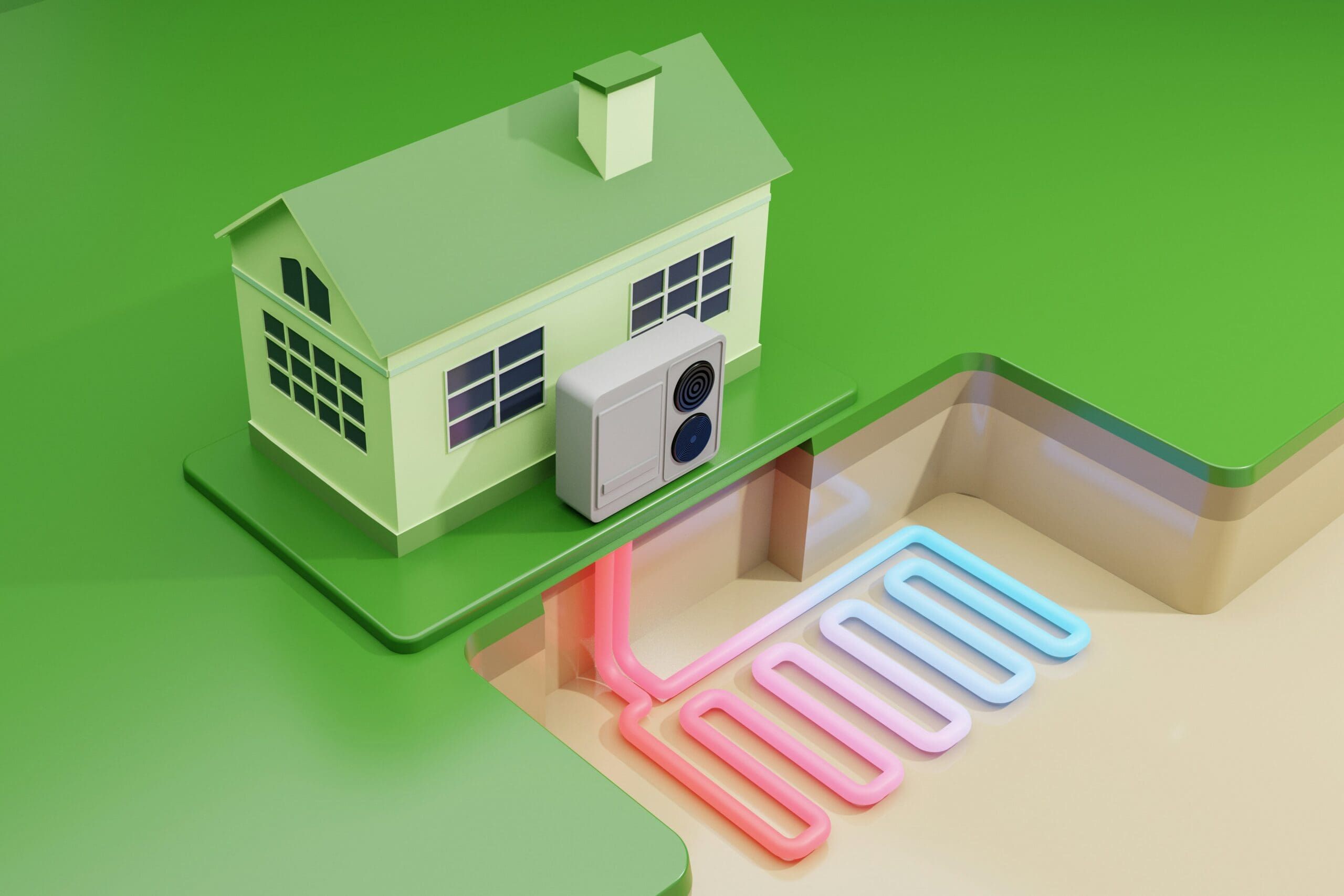Are Heat Pumps Worth It?

Estimated reading time 8 minutes
Many of us are now looking to see how we can improve our carbon footprint and are taking steps to not only benefit the environment but also our finances too. One way many households are taking this step is via the introduction of heat pumps. For some of you reading this, you might well be scratching your head wondering what on earth a heat pump is. For others, you may have already conducted your research but are still unsure whether to press ahead.
In this blog, we hope to clear up any questions and also demonstrate whether investing in a heat pump could help drive up the value of your home.
What is a heat pump?
A heat pump is a form of heating system that moves heat from one place to another. Using similar tech to that found in air conditioning units or refrigerators, they take heat from the air, the ground or even water and increase its temperature to warm a building. Seen as a more efficient method of heating than gas or electricity, they can serve a dual purpose as they can be switched between warming a room or cooling it down. This then removes the need for additional systems to be installed. Furthermore, true efficiency lies in the fact that a heat pump can produce approximately three units of heat for each unit of electricity it uses.
There are two different types of heat pump available for homeowners in the UK, each delivering different benefits, costs and disadvantages. The air source heat pump and the ground source heat pump. Let’s take a look at both.
What is an air source heat pump?
An air source heat pump transfers heat from the air outside the house to water. Absorbing the heat via a fluid, it passes through a heat exchanger and heat pump before it gets transferred to the water. This heated water then gets used to warm up your home and be used in baths, showers, washing and any other area where hot water is required.
What is a ground source heat pump?
The ground source heat pump works by moving heat from the ground surrounding your home to heat radiators, underfloor heating and water. A pipe is buried underground which the antifreeze/thermal fluid passes through. As it does so, it absorbs heat from the ground. This heated fluid then moves through a heat exchanger and a heat pump causing the temperature to rise significantly. It is this heat that is then transferred to water.
How much does a heat pump cost?
It can be quite expensive to have a heat pump installed and you may not see a break-even point for some considerable time. Prices vary on the type of heat pump you choose as well as the energy source it is replacing. However, the annual savings on energy costs can be quite considerable and could top £1,000.
Thankfully the boiler upgrade scheme is in place to alleviate some of the expense. The BUS gives homeowners £7,500 towards the cost of replacing an existing gas or oil boiler with a heat pump. This doesn’t mean you’ll just be picking up a small portion of the bill though.
Should you be opting for an air source heat pump (ASHP) for a typical UK property, you could be looking at spending up to £10,000 after you’ve received your £7,500 reduction.
If you were to choose a ground source heat pump (GSHP) you could also see the £7,500 incentive applied but could also see yourself having to pay a further £20,000 yourself.
You then have the running costs to factor in and for either type of heat pump, you could easily see an annual expense of £1,000-£2,000.
What are the advantages of a heat pump?
Heat pumps are a huge outlay initially but the benefits you get from them can see that expense being justified. Let’s take a look at the key benefits of adding a heat pump to your home.
Longer lasting than other heating systems
Heat pumps are durable, long-lasting additions to the home. As long as you keep on top of the service schedule, you could benefit from 20 years or more from the system you choose.
Heat pumps are safer than gas boilers
Your gas boiler should be inspected yearly and whilst it is certified as safe, there is still every chance a fault could develop. Heat pumps remove that concern as there is no fuel to burn and no chance of exposure to harmful substances like CO2.
Less maintenance
Gas boilers should only be serviced by a specialist engineer and whilst heat pumps will require professional servicing, there are certain elements of maintenance you can safely do yourself.
High levels of efficiency
Any installation that costs a significant sum to install wants to be delivering you value for money and heat pumps can certainly do that. Heat pumps can deliver up to as much as 400% efficiency whilst gas and electric boilers can only ever reach 98/100% efficiency.
These staggering numbers can change in colder weather, but the ASHP can still see an efficiency of 200% if temperatures reach 15C.
Doubles up as an air-con system
In some cases, your heat pump can work in reverse and provide you with a cool environment rather than a warm one. It would be best to discuss this with the provider of the heat pump before you buy though. Not all systems are able to do this.
Environmentally friendly
Carbon emissions are one of the biggest problems we face, and much is being done to reduce them. Heat pumps help do this. It has been estimated that a heat pump can reduce your carbon emissions by as much as 80% and this could mean that moving from a gas boiler to a heat pump could see you save 1,800KG of CO2 every year!
What are the disadvantages of heat pumps?
As with everything that has its advantages, disadvantages do follow and with heat pumps, it is no different.
The cost and time it takes to recoup
As you’ve already seen, you could spend many thousands of pounds on having a heat pump installed. In some cases, a ground source heat pump could land you with a bill well over £20,000 and this, along with the annual running costs, means you could be looking at more than 30 years before you break even. You may not even be eligible for the £7,500 govt assistance either.
Installation can bring disruption
The process of installing either type of heat pump can cause considerable disruption to your home. This could include work on both internal and external walls, electrical work, plumbing work, removal and swap out of radiators, and the digging of holes for the pipework.
Specialist surveys and installation required
Before you shop for a heat pump, you need to find out if your home is suitable. A specialist heating engineer will conduct a survey for heat/loss and be able to determine whether a heat pump is a viable option for your home. From here, they can determine what heat pump you’ll need to match the requirements of your house. This may see the need for radiators to be replaced and pipework to be changed. Compare this to standard boiler installation and it is considerably more complex.
You may need planning permission
In many cases, you will not need planning permission for a heat pump as they come under permitted developments, however, certain restrictions mean that this is not always an option. For example, if you own a listed property, you’d need planning permission before having a heat pump installed. Check if your home has permitted development rights before proceeding as any legal costs you may incur for an illegal installation could be quite significant.
Noise pollution
Some heat pumps are especially noisy. Current rules state that an ASHP cannot exceed 42dB at a distance of 1 metre from the centre of a neighbour’s habitable room window. There are many units that claim to be “low noise”, but you should always check the decibel level before opting for it.
High running costs
The heat pump needs electricity to run and typically electricity is more expensive than gas, meaning that a heat pump's running costs can be more than that of a standard gas boiler.
The property may not be suitable
Not all homes can benefit from the addition of a heat pump, some just simply aren’t suitable. You’ll need to have a valid EPC issued within the last ten years and have an installation capacity of 45kw. In addition, new build properties are ineligible as are social housing properties.
Will a heat pump increase property value?
It can do. Scottish Power published a report that showed you could see up to 3% added to the value of your home. Based on the average house value at the time the report was conducted, this could see as much as £8,000 added to the value of your home.
Adding a heat pump can be a good way to drive energy costs down and see the value of your home move up but it also comes with a large initial outlay. There is certainly much to think about before you take the leap.
At Bettermove, we sell your house fast so you can remove the pitfalls of market fluctuations, weak chains and lengthy sales processes. Without any fees either, we sell your house for free meaning the amount we offer is the amount you get. Why not speak to our team today and organise a rapid house sale today?



